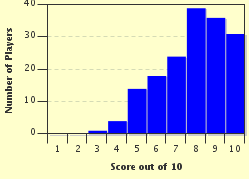Quiz Answer Key and Fun Facts
1. One of the kings of England was Richard, nicknamed "Coeur de Lion" or "the Lionheart". Which Richard was this?
2. The Roman general Julius Caesar added which region to Rome's control in the 50s BC?
3. With which island was Napoleon NOT closely associated?
4. Which future American president won a battle AFTER a war was in fact over?
5. One of the last Pharaohs of Egypt before the Roman conquest was a woman. Who was she?
6. What did King David of Israel not do in his lifetime?
7. Which Spanish military leader with only 500 men overthrew the Aztec Empire in the early 16th century?
8. The greatest ancient Greek military leader was Alexander the Great. Into what region did he NOT lead his army?
9. The last Tsar of Russia was Nicholas II, who was murdered with his family in 1918. What was the name of his wife, the last Tsarina?
10. In the Second Punic War the Carthaginian general Hannibal led his forces from Spain through the Alps to attack Italy from the north. What animals is he famous for using during this march?
Source: Author
Ampelos
This quiz was reviewed by FunTrivia editor
NatalieW before going online.
Any errors found in FunTrivia content are routinely corrected through our feedback system.


